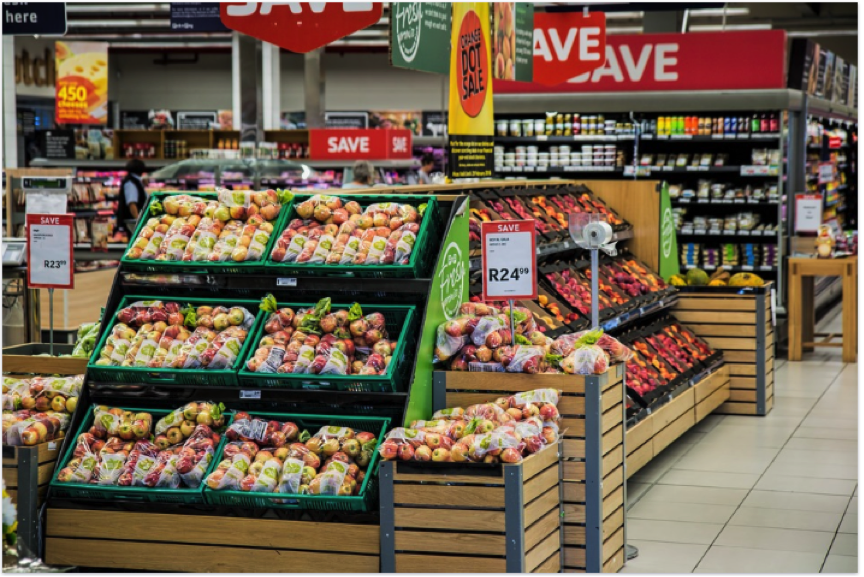Plastics and Groceries, Two Seemingly Synonymous Things
Rose Boardman
It’s almost impossible to walk down the aisle of a supermarket without seeing your favourite food items wrapped in plastic. Plastic pollution is now a major environmental issue and our supermarkets are right at the heart of it. Although some of this packaging is critical in today’s modern life, by offering protection and enhancing products shelf life (thus minimising food waste), the demand for consumer convenience has resulted in high levels of unnecessary, single-use packaging options.
Isles and isles of plastic are a common sight in grocery stores. Photo: Pixabay
So why should you care?
The grocery sector is one of the largest users of plastic packaging, accounting for over half of the 1.5 million tons of consumer plastic packaging used in retail annually. The plastic packaging industry consumes natural resources, and forms around 20% of household packaging waste, typically ending up in landfill.
The journey from the source to your kitchen cupboard plays a big part. For example, let's take a packet of salad leaves. They’re grown, picked and processed. And then packaged to keep them fresh (in plastic) and sent to supermarkets where they will need to sit on the shelf for at least a week or more. Finally you pick up the packet from the shelf, and it makes it into your household, where you eat the food and the packaging ends up in the landfill within a week of purchasing it. You may diligently place the plastic in your recycling (after rinsing) but it’s likely it will never be recycled (catch our upcoming article on the 17th to find out why).
One of the issues with cutting out plastic packaging for food, is that plastic can extend the shelf-life of fresh produce, and thus minimise food waste. Did you know that over 10 million tonnes of food is binned every year in the UK? Food that is fit for consumption, but isn't eaten. This is mainly from supermarkets and food outlets, but also from households too. Not only is this an economic problem, but it is also an environmental problem. Food requires a lot of resources to produce, including large amounts of water, fertilisers, land, and fossil fuels. Food waste typically ends up in landfill sites, where it decomposes and releases methane, a greenhouse gas that plays a big part in climate change.
So what can you do to help?
Finding ways to reduce the amount of plastic used in food packaging, whilst, keeping products protected and fresh to minimise food waste, is an important step for a brighter, greener future.
Here are a few things to think about next time you do your weekly shop:
Bring your own bags: Take mesh bags, jars, or Tupperware, to put your loose items in, and bring cloth bags to pack at the till. Save on that 5p (soon to be 10p) and the environment.
Opt for loose, fresh, and unprocessed fruit and vegetables - Frozen and processed vegetables are packaged in plastic, and frozen food has the highest highest carbon footprint.
Opt for products with easily recyclable (glass, paper, cardboard, aluminium), or reusable packaging.
Bulk up: If you can’t avoid plastic, buying products in bulk greatly reduces the amount you’re using, and will save you some pennies too! You can even find you local bulk store (UK, US/Canada), and buy completely packaging free.
Eat less meat, fish & dairy: Not only will you save on plastic, but you’ll also reduce your carbon footprint (the livestock industry alone accounts for 18% of global greenhouse gas emissions). If you do opt to buy some, the deli counters will become your new best friend. You can take your own containers or wrap, and buy completely plastic free.
Get in that kitchen: Plan your weekly meals, and instead of grabbing packaged food, like sandwiches, snacks or ready meals, why not make your own, and don’t forget to take your own cutlery with you.
Loose fruit, veg, grains, nuts (you name it) from supermarkets, greengrocers or market stalls is the way to go. Photo: Pixabay.
The easiest way to do your food shop with minimal plastic is to utilise your local greengrocers, health food shop, bulk or zero waste stores. Greengrocers typically sell loose, seasonal, and local produce, minimising both plastic and your carbon footprint. Health food shops, bulk stores and zero waste stores allow you to bring in your own containers to refill, meaning you only pay for what you need, minimising food waste, cutting costs, with no plastic in sight!
But supermarkets are also becoming more plastic free, with the likes of Morrisons, Waitrose and Tesco introducing plastic free isles for fresh fruit and veg in trial stores. Morrisons have also replaced their plastic produce bags with paper bags. Waitrose has gone one-step further by implementing refill stations for dry produce such as cereal and pasta, wine and beer, as well Ecover detergent and washing up liquid. They’ve even got a frozen fruit pick and mix! Waitrose has also introduced a 15% reduction in price on all unpackaged goods in a bid to entice customers - but we don’t need to be told twice! Let’s hope they implement these changes nation-wide.


